These private admissions obtained by The Grayzone further expose the public whitewash of the Douma cover-up, and undermine the ongoing attacks on the whistleblowers who challenged it, Aaron Maté reports.
 Since the explosive revelation that an investigation by the Organisation for the Prohibition of Chemical Weapons (OPCW) in Syria was manipulated, a smear campaign has been waged against a pair of veteran OPCW scientists who challenged the cover-up.
Since the explosive revelation that an investigation by the Organisation for the Prohibition of Chemical Weapons (OPCW) in Syria was manipulated, a smear campaign has been waged against a pair of veteran OPCW scientists who challenged the cover-up.
The two whistleblowers have been dismissed as rogue, uninformed, and duplicitous actors. Their detractors include the current OPCW director general; NATO member state ambassadors; and anonymous, self-described OPCW officials laundering fabricated claims through NATO member state-funded outlets.
OPCW documents and correspondence obtained by The Grayzone offer a stark contrast to these public attacks. Among several revelations, they show that before the attempts to discredit the whistleblowers, OPCW directors privately criticized the chemical watchdog’s suppression of the investigation, and supported the inspector who vocally protested it.
One of these executives, however, feared that raising alarm about the scientific fraud would help the “Russian narrative” — a tacit admission that the organization’s independence and impartiality have become subordinate to geopolitics.
Please Contribute to Consortium News During its 2020 Winter Fund Drive
The dissenting inspector, 16-year OPCW veteran Brendan Whelan, was a member of the OPCW Fact-Finding Mission (FFM) that investigated an alleged chemical attack in the Syrian city of Douma on April 7, 2018. The team’s findings raised major doubts about allegations of Syrian government culpability, the pretext for a U.S.-led bombing of Syria one week later.
But senior OPCW officials, in conjunction with a U.S. attempt to influence the investigation, censored the evidence and released unsupported conclusions. A series of damning leaks later exposed the deception.
Rather than having their complaints addressed, Whelan and the other known dissenting inspector, 12-year OPCW veteran Ian Henderson, have been subjected to a second deceit: false claims about them and their investigation.
Whoever is behind these public attacks, the private OPCW emails and documents obtained by The Grayzone further undermine them. In addition to revealing initial praise by OPCW brass for Whelan’s attempt to protect the investigation, these leaks provide a new window into how other officials compromised it:
- One top official acknowledged the doctoring of the Douma evidence. But rather than order an investigation into how it occurred, this official sought to have an email protesting the censorship erased from the OPCW’s servers.
- Another executive, who appears to have been deeply involved in the scientific fraud, sidelined the inspectors who collected the evidence in Syria. This same OPCW official also engineered a delay that ensured that the most vocal dissenter, Whelan, would no longer be in the picture.
- By contrast, two senior directors praised Whelan’s opposition to the Douma probe subterfuge. (These directors are distinct from the director general, whom they work under.) The first director criticized the censorship of evidence, and also signaled that it was politically motivated. Yet this same director was also hesitant to press the issue, out of fear that doing so would “feed… the Russian narrative.”
- The second director lauded Whelan’s contributions to the OPCW, as well as his effort to defend the Douma investigation from fraudulent behavior.
These documents show that internal concerns about the Douma cover-up went beyond members of the FFM team to even the highest levels of the organization.
In addition, The Grayzone has previously published an email from a former senior official expressing alarm about the scandal and the intimidation of dissenting voices. A subsequent statement from a separate OPCW official criticized the “abhorrent mistreatment” of the dissenting inspectors.
This account is based on newly disclosed and previously published documents, as well as OPCW sources familiar with the investigation.
‘Report Not Redacted at Behest of ODG’
A June 22, 2018, email exchange was the opening salvo in the standoff over the Douma cover-up.
Two days earlier, the OPCW’s Fact Finding Mission (FFM) had completed its draft of the Douma investigation report.
The report’s chief author was Brendan Whelan, a senior member of the FFM and part of the Advance Team that went to Damascus.
A 16-year OPCW veteran, Whelan was widely considered the OPCW’s foremost expert in chemical weapons chemistry and analysis. He presented some of his ground-breaking work on chemical weapons analysis to the OPCW’s Scientific Advisory Board in October 2017.
When the OPCW FFM deployed to Douma in April 2018, Whelan served as the mission’s scientific coordinator. Upon its return to OPCW headquarters in the Hague the following month, he was tasked with delivering a briefing to state representatives on the team’s progress.

A senior OPCW official informs colleagues that Brendan Whelan will brief state representatives on the Douma investigation, May 2018: “Brendan will focus on the Douma incident with a presentation on how we went about our work in this case.”
The product of more than two months of work, the Douma report’s findings were explosive. With no evidence of a chemical weapons attack, the document failed to support the allegations lodged by a trigger-happy Trump administration that had already bombed Syria, along with the U.K. and France, before the OPCW could reach Douma in April.
Neither nerve agents nor their degradation products had been detected, and there was no proof of chlorine gas use. A group of toxicologists from a NATO-member state ruled that the cause of death was inconsistent with exposure to chlorine gas, and could find no other chemical agents as a plausible alternative.
In fact, the report considered two alternative hypotheses, one of which included a “non chemical-related” incident — possibly an allusion to the incident being staged on the ground.
Senior management had been given the report’s executive summary and raised no concerns. The document had been peer-reviewed by members of the FFM team, including the team leader, and was being prepared for publication.
But shortly thereafter, Whelan made a shocking discovery: unidentified officials had radically altered the finished product and rushed out a doctored report for imminent publication, all without informing the team.
The doctored version was a whitewash. Key facts were missing or misrepresented, and conclusions had been re-written, to disingenuously suggest that a chlorine gas attack had occurred in Douma.
The ramifications of this subterfuge were staggering. In effect, the investigation team were blindsided and undermined by an imposter report that would, based on unfounded conclusions, give post facto justification for the U.S., U.K. and French military strikes on Syria on April 14, 2018.
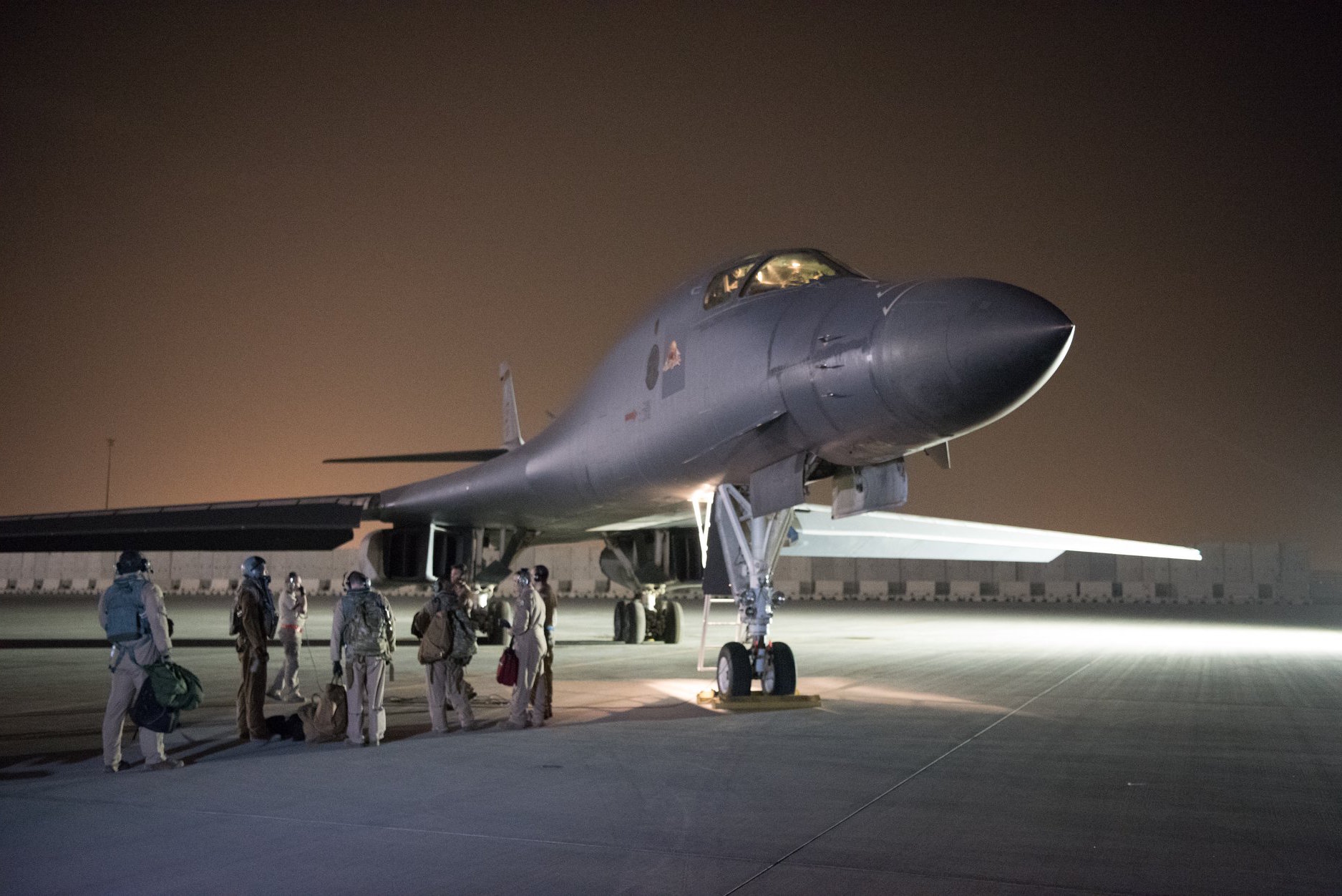
U.S. bomber prepares to launch a strike mission from Al Udeid AIr Base, Qatar in April 2018 in support of the multinational response to reports of Syria’s recent use of chemical weapons. (U.S. Air Force/Phil Speck)
Alarmed at this discovery, Whelan wrote an email of protest on June 22 expressing his “gravest concern.” It was addressed to Robert Fairweather, the then-OPCW chief of cabinet, a position second only in terms of influence to the director general. Fairweather’s deputy and the other FFM team members were copied.
“After reading this modified report, which incidentally no other team member who deployed into Douma has had the opportunity to do, I was struck by how much it misrepresents the facts,” Whelan wrote.
Whelan’s letter was revealed by British journalist Peter Hitchens and published by WikiLeaks in November 2019.
Unpublished until now was Fairweather’s response.
Fairweather did not deny that the report had been redacted, but insisted that the censorship was not done on the director general’s behalf. “The report was not redacted at the behest of ODG,” Fairweather wrote. “The only input ODG had was to ask that the report did not speculate.”
Fairweather added, “This is only an interim report which leaves open a large amount of further work on a number of areas.”
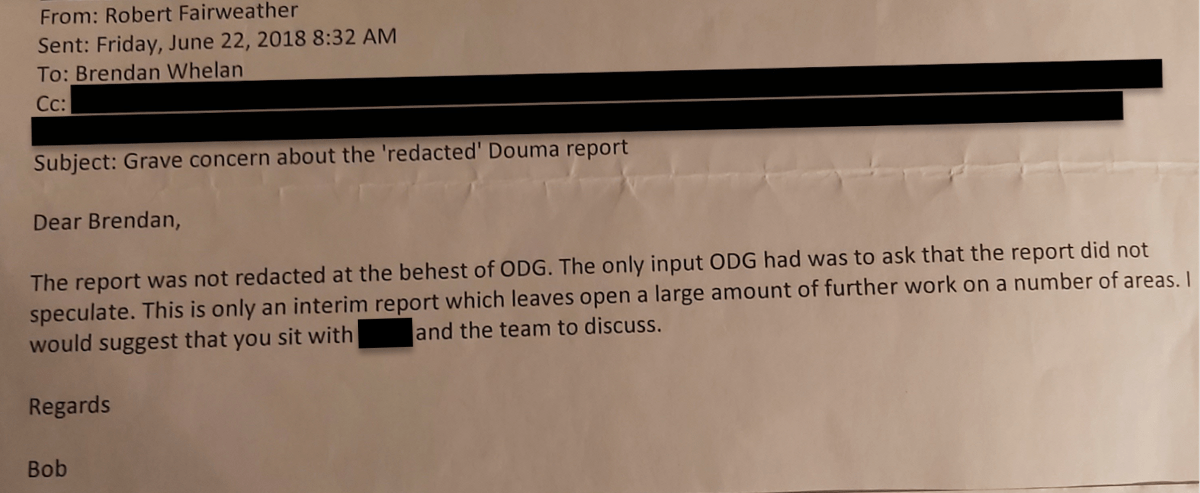
OPCW Chief of Cabinet Robert Fairweather acknowledges the redaction of the Douma report, but insists that it was not done at the “behest” of the director general.
Censoring the Censorship Protest
Brendan Whelan’s intervention thwarted the publication of the doctored report. But Robert Fairweather’s nonplussed response sent a clear message: while he was prepared to acknowledge the censorship and delay the report’s release, there would be nothing further done about it.
Rather than launching an immediate investigation into the deception, Fairweather was apparently content to leave the inspectors to their own devices.
Fairweather instructed Whelan, the dissenting inspector, to “sit with the [team leader] and the team to discuss.” This team leader, whose name The Grayzone is withholding, appears to have taken part in the fraudulent re-editing that Whelan had protested.
Fairweather was, however, proactive in one respect — he initiated another act of censorship.
Shortly after Whelan sent his letter of protest, Fairweather wrote back to him and the rest of the recipients a one-sentence email: “Robert Fairweather would like to recall the message Grave concern about the ‘redacted’ Douma report.”
Such a request — a rare course of action among OPCW officials — would amount to the OPCW deleting Whelan’s email of complaint from its server and the inboxes of each recipient. This recall request, previously unpublished, suggests that senior OPCW officials were not only reluctant to take Whelan’s concerns seriously: they were intent on erasing them from the documentary record.
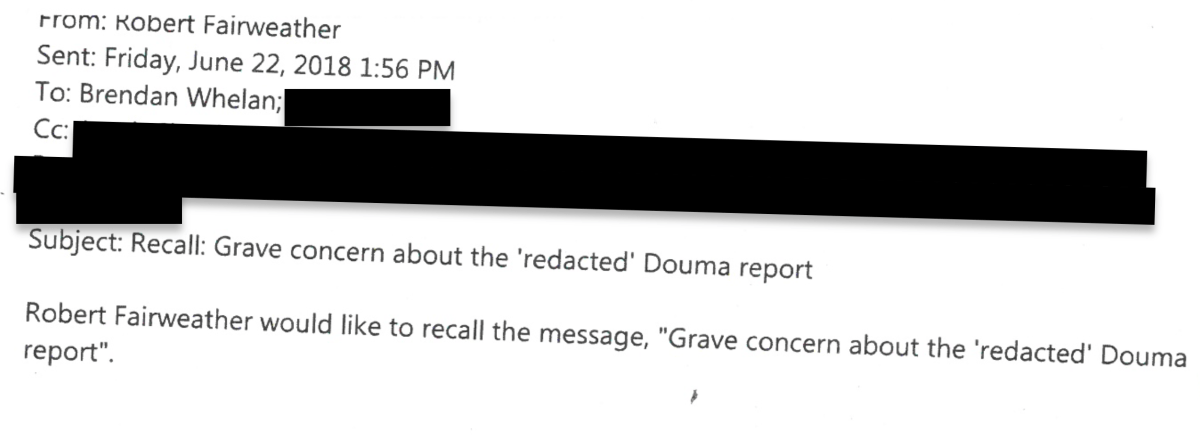
OPCW Chief of Cabinet Bob Fairweather requests the deletion, or “recall,” of an email from Brendan Whelan that protested the doctoring of the FFM’s original Douma report.
The recall request is the exact opposite of the key action Fairweather did not take: launching an investigation into who was responsible for censoring and distorting the findings of the original report.
Fairweather, who now serves as the U.K. special representative for Sudan and South Sudan, did not respond to emailed questions from The Grayzone about his exchange with Whelan and the doctoring of the initial report.
Fairweather left the OPCW in September 2018. Three months after his departure, the U.K. government made him an officer of the Order of the British Empire (OBE) for “services to international relations.”
‘Selective Nature of Presenting Facts’
Not everyone was satisfied with Robert Fairweather’s response. Emails obtained by The Grayzone reveal that one senior OPCW director was troubled by the events.
This senior official was not directly involved in the Douma investigation, but was kept updated on the internal dispute. The executive was shown Whelan’s complaint before Fairweather requested its recall.
In an email to Whelan, the director voiced concern that Fairweather had belittled Whelan’s complaints of censorship in responding that “this is only an interim report,” and that further work was still to be done.
“I don’t think saying this is an ‘interim report’ quite does it in defending the selective nature of presenting the facts,” the director wrote (emphasis added). “From what I heard, at least some of them should find their way back to the report.”
‘You Took All the Steps’
The OPCW director also praised Brendan Whelan’s June 22 intervention.
“My respect, I think your email is very carefully crafted, without emotions, not accusing anybody but laying out the facts and concerns very clearly,” the executive wrote. “Really well done.”
In another email, the director told Whelan: “[Y]ou took all the steps to maintain your moral and professional integrity and that’s what matters most.”
The OPCW director also responded positively to news that Whelan’s superiors, in response to his email of protest, had agreed to cancel the publication of the doctored report.
“I hope — an important precedent for the future,” the executive wrote. The director continued:
I[t] should serve as an encouragement to future FFM members that it is important to get engaged in drafting and insist that their findings and possible concerns be adequately considered and that simply ignoring mission member’s views is not an acceptable way of doing business. Through your action, you could actually be making the first step toward having a more professional transparent and sound fact-finding mission.
A Second Director’s Praise
The director was not the only top OPCW official to praise Brendan Whelan’s efforts.
In August 2018, a second OPCW director wrote a glowing performance appraisal that celebrated Whelan’s contributions to the chemical watchdog. The appraisal came less than two months after Whelan’s June 22 email of protest, and just a few weeks before Whelan’s scheduled departure in early September 2018. (This was Whelan’s second tenure with the OPCW, dating back to 1998.)
“I can say without being unfair to others that you have been the professional in the TS [Technical Secretariat] that has contributed the most to the knowledge and understanding of CW [Chemical Weapons] chemistry applied to inspections,” the second OPCW director wrote. “You produced a lot of knowledge and unselfishly shared every bit of what you know with others, enthusiastically. I thank you very much for this.”
The second director also paid tribute to Whelan’s protest of the Douma probe censorship.
“I want to commend you as well for your character and strong values, which have stood firm at times when it would have been easier to simply ‘let it go’ without fighting for what you believed was right,” the second director wrote. “Thank you for everything, it will be difficult to replace you, now that your tenure is about to end.”
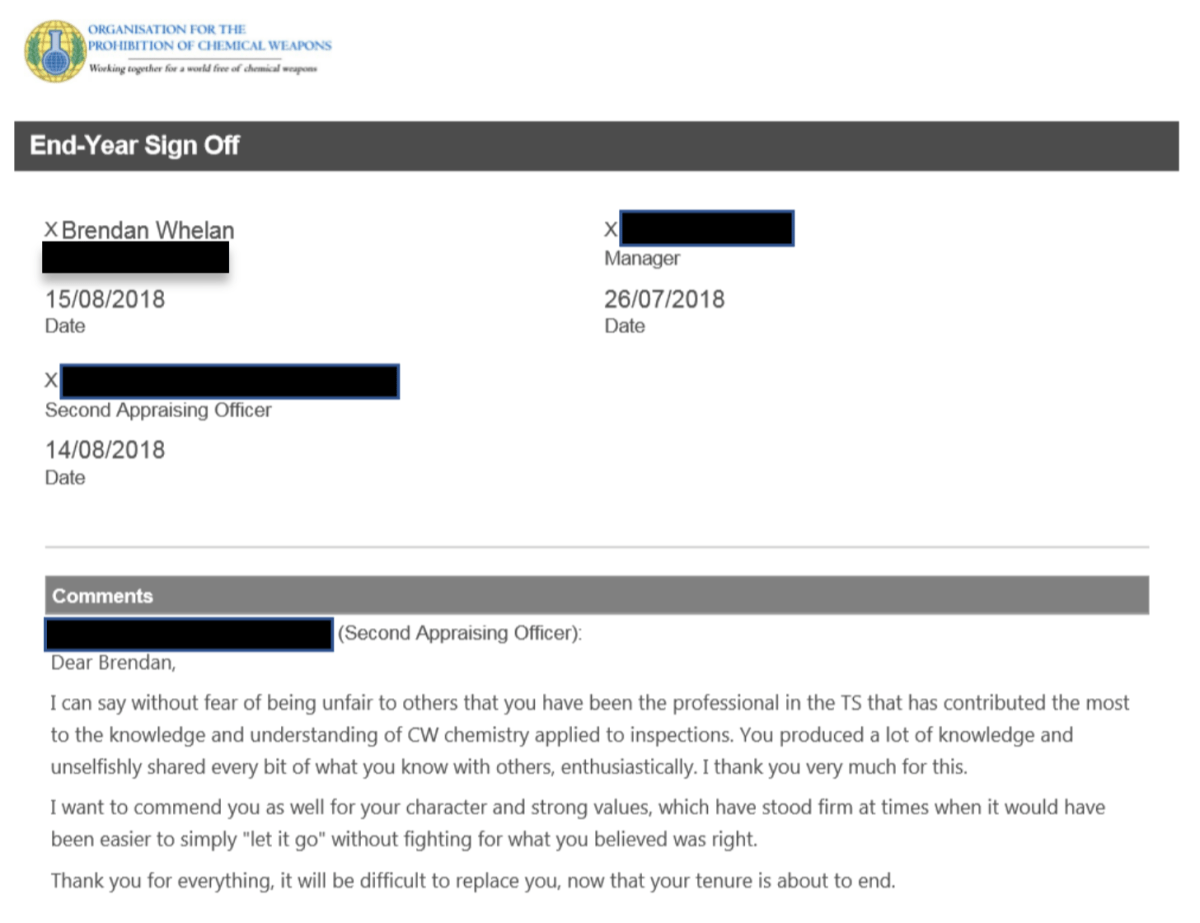
A second OPCW director praises Brendan Whelan’s efforts.
The Summer Shutdown
While Brendan Whelan’s superior may have lamented his pending departure, the officials who censored his report apparently saw it as an opportunity.
After the pivotal June 22 intervention, the Douma team leader took steps that effectively neutralized Whelan until his scheduled exit in early September 2018, just a few months later.
A compromise “interim” report was published on July 6. The interim report no longer contained the deceptive edits that unknown officials had tried to insert, but, nonetheless, continued to omit several key findings from the team’s original report.
It would soon become clear that this interim report was just a stopgap measure. Issuing the watered-down document, with its uncomfortable facts removed, left the door open for future publication of the doctored findings once Whelan was no longer in the way.
In early July, OPCW officials announced the establishment of a new “core” team that would be selected to write the final report. The so-called core team excluded not just Whelan but also the team members who deployed into Douma. There was one exception: a paramedic.
In place of the experienced inspectors, the “core” team now included junior officials who were just beginning their career with the organization.
As the confidentiality officer during the deployment to Douma and the post-mission period, Whelan had up until that point been responsible for management of all of its materials. On July 2, just days before the interim report’s release, Whelan was instructed to hand over all confidential and non-confidential Douma data to the “core” team.
Whelan was also relieved of his duties on the Douma team. “Nominally I continued to be part of the team, but in reality I was now side-lined from any further meaningful contribution to the investigation,” Whelan later recalled, in an April 2019 letter to the director general. “I was no longer in charge of report writing and my responsibility for sampling and analysis issues was transferred to a member of the FFM Alpha ‘core team.’ ”
The team leader also announced some news: he would be taking a six-week vacation until Sept. 4, one day after Whelan’s scheduled departure from the organization.
With the nominal leader taking an extended break and responsibility handed to junior officials, some of whom had not even set foot in Syria, the investigation was effectively on pause until such time as Whelan was gone for good.
‘Fear of Russian Narrative’
With Brendan Whelan out of the picture and the rest of the Douma inspectors effectively sidelined, it was a small group of “core” team members that produced the scientifically flawed final report of March 1, 2019.
The eight-month interval since the publication of the interim report is notable. The majority of the investigation had already been conducted in advance of the original suppressed report of late June 2018. This includes 70 percent of the chemical analyses, 90 percent of the interview assessments, and, judging from the bibliography, all of the scientific research on the chemical analysis and toxicology.
Despite this, the OPCW leadership, in an attempt to rebut allegations of scientific fraud, has claimed that “the FFM undertook the bulk” of its work in the period after Whelan’s departure. In fact, it appears that the OPCW deliberately procrastinated and prolonged the investigation so as to give the false appearance that significant “work” was taking place.
Freed from the inconvenience of dissenting experts, the final report baselessly claimed that there were “reasonable grounds” to believe that a chemical attack occurred in Douma, and that “the toxic chemical was likely molecular chlorine.”
When the whistleblowers’ concerns about the final report later became public, the OPCW leadership accused Whelan of trying to improperly “influence” the investigation. In reality, Whelan, after departing the OPCW in September 2018, only re-entered the Douma fray after the final report’s publication.
Whelan first wrote the director general, Spanish diplomat Fernando Arias, a private letter on March 25. (Arias had taken over from his predecessor, Ahmet Üzümcü of Turkey, in July 2018, just weeks after the publication of the FFM’s interim report.)
Uncertain that his concerns would ever make it to Arias’ desk, Whelan once again turned to the first OPCW director who had praised his initial intervention back in June 2018.
Whelan wrote on April 4, 2019, over a month after the final report was published. Whelan asked for “advice and assistance” in getting his concerns directly to the director general. He offered to fly to the Hague if Arias would agree to meet.
The director responded promptly, apparently not surprised that Whelan had gotten in touch: “good to hear from you and yes, I actually anticipated to hear from you one way or the other once the report on Douma is out.”
The director seemed equally disturbed by the Douma report. “Frankly speaking, the whole thing keeps confusing me,” the executive wrote. “I can’t make my mind up around many things and that’s an uncomfortable feeling, especially given the hell broken loose about the Douma report.”
The director agreed to help Whelan explore how to deliver his concerns to Arias. The top official also revealed that a senior OPCW colleague with chemical weapons expertise (who was not one of the inspectors) had similarly expressed doubts about the final report.
But despite these misgivings, the director added a telling statement that indicated that the Douma probe had become too politicized for any valid concerns to make a difference:
“He [the senior colleague] is also full of skepticism [about Douma] but … I fear there is little one can do since the report is final and out – unless one wants to feed in the Russian narrative and that I would never do as they really are not bona fide friends of this organization, that’s for sure.” (emphasis added; ellipsis in original)
Despite doubts about the veracity of the published report, the director continued to make it clear it was a fait accompli and beyond reproach. “I suppose we both concur that it is difficult to imagine that the DG would change his mind and order issuing another, revised report or anything of this kind. The report is simply out,” the official wrote resignedly.
These qualms about bolstering a perceived “Russian narrative” after the report’s release stand in stark contrast to the OPCW’s documented willingness to enable a U.S. narrative since the start of the investigation.
In early July 2018, just before the release of the interim report, Robert Fairweather, the then-chief of cabinet, summoned the FFM inspectors to meet with a visiting U.S. delegation. The unidentified U.S. officials sought to influence the Douma team into concluding that the Syrian government had committed a chemical attack with chlorine.
The U.S. team promoted this chlorine theory despite the fact that it was still not publicly known that no nerve agents had been found in Douma – an indication, perhaps, that the U.S. played a critical role in shaping the ultimate “narrative.”
‘Difficult to Pursue in Open’
In a follow-up email exchange on April 17, the OPCW director again intimated that political imperatives would overrule any of the concerns about the Douma probe’s impartiality.
At the bottom of an email, Brendan Whelan mentioned an open-source paper written by a group of British scholars criticizing the Douma report: “PS. A very interesting and insightful article has just been published by a group of UK academics on the Douma report. I can send you the link if you are interested,” Whelan wrote.
Fernando Arias would later suggest in a public statement that this comment implicated Whelan in a breach of confidentiality. But in fact, the director had already seen the U.K. academics’ paper – and again signaled that political concerns would trump any scientific ones.
“Yes, I have seen the analysis by the UK academics,” the director wrote. “Unfortunately, this is a discussion that is difficult to pursue out in the open, knowing that it is already being played by parties who are decidedly not bona fide supporters of the CWC [Chemical Weapons Convention].”
The director’s comments read as an acknowledgment that the OPCW was now subordinate to geopolitical drama. The OPCW was willing, the executive’s words suggest, to suppress concerns about scientific fraud and political interference if paying attention to them could “feed [into] the Russian narrative” and other undesirable “parties.”
‘A Fully Unbiased Take’
In another nod to the Douma report’s bias, the executive suggested that, although it was too late to revisit the Douma FFM report, there was another option. Whelan’s concerns, the executive proposed, could be sent to the Investigation and Identification Team (IIT), a separate body within the OPCW tasked with identifying the perpetrators of chemical attacks.
The senior official intimated that this idea had already been discussed among management, and that this new IIT team might be less compromised.
“I am also thinking how things could develop further and basically see just one option that seems realistic, given that we can’t turn back the clock, and which has been already floating around: it relates to all your points being forwarded to the IIT for a fresh and comprehensive assessment by people who are all also newly recruited and should therefore have a fully unbiased take on things,” the executive wrote on April 18.
The possibility that the IIT would be “fully unbiased” was a clear acknowledgment that the FFM had not met that same standard.
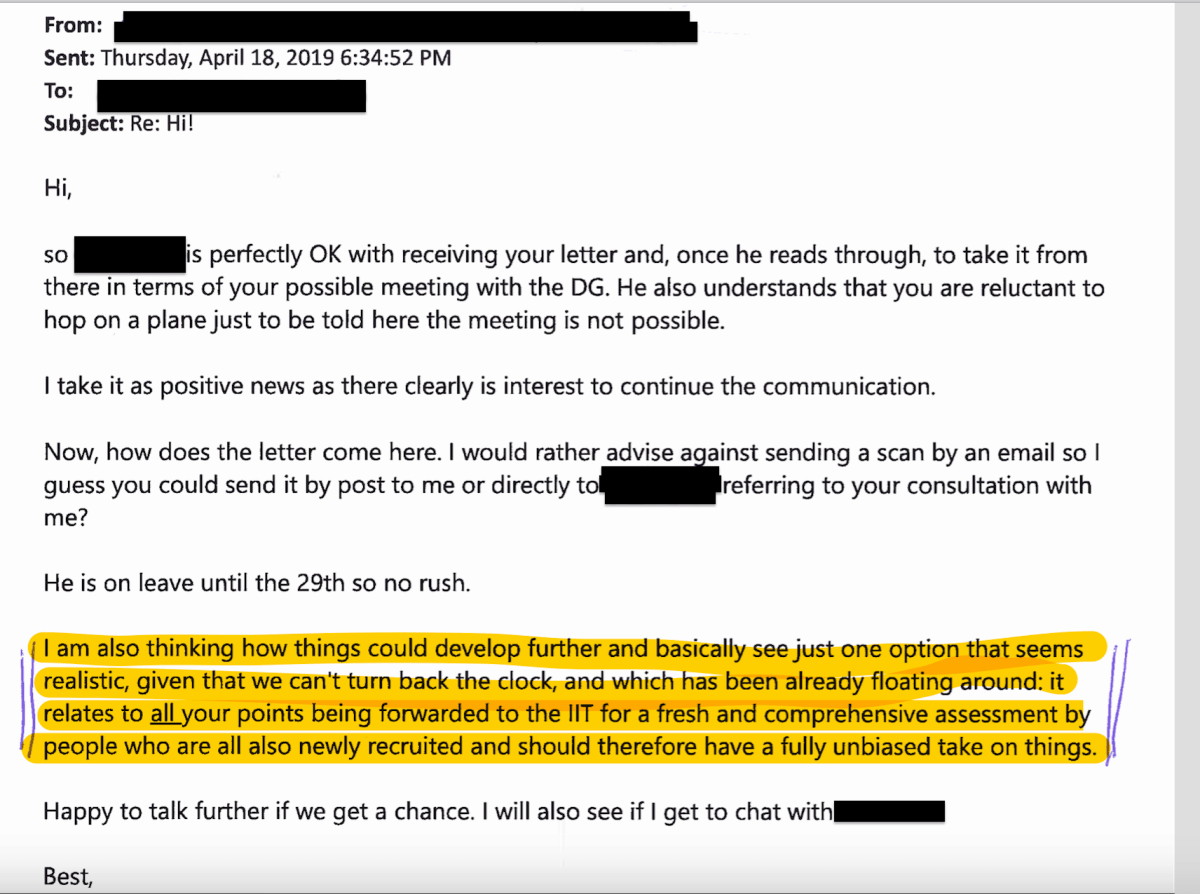
An OPCW director tells Brendan Whelan that the IIT, unlike the Douma FFM, may be able to “have a fully unbiased take on things.” The director also says that the chief of cabinet “is perfectly OK with receiving your letter” to Director General Arias. The letter expressed Whelan’s concerns about the Douma investigation and its final report.
‘Continue Communication’
Brendan Whelan’s request to meet with Director General Fernando Arias was denied. But the senior executive did arrange to get a letter from Whelan to the OPCW chief.
The Grayzone has previously published Whelan’s April 25, 2019, letter to Arias, outlining his concerns about the Douma investigation in extensive detail.
Arias replied to Whelan five weeks later, on June 7. As had happened with Whelan’s initial protest about the suppressed interim report, Arias ignored Whelan’s concerns about scientific and procedural misconduct throughout the investigation.
Instead, Arias’ only reaction was to reiterate his confidence in the final Douma report, and to falsely claim that the work done after Whelan left the OPCW justified its conclusions.
Bizarrely, Arias would go on to publicly dismiss Whelan’s letter as evidence of a mischievous “desire to have continued access to, and influence on, the Douma investigation.” This contrasts starkly with what the director told Whelan in their correspondence.
The director told Whelan that the chief of cabinet “is perfectly OK with receiving your letter,” and that “there clearly is interest to continue the communication.” The chief of cabinet is Arias’ top deputy, and acts on his behalf.
Public Attacks After Private Praise
Fernando Arias’ disingenuous comment about Brendan Whelan’s “desire” to “influence” the Douma investigation came as part of a February 2020 OPCW inquiry that deceptively characterized the whistleblowers as rogue, uninformed actors.
Since then, the campaign against the inspectors has intensified. At the United Nations Security Council, the U.S., U.K., and France – the states that bombed Syria based on the Douma allegation – have dismissed the inspectors’ concerns as Syrian and Russian “disinformation.”
In October, these same governments even blocked the OPCW’s first director general, José Bustani, from testifying in support of the inspectors, with whom he worked during his tenure.
Bellingcat, a NATO member state-funded website, has published a number of fallacious attacks, including an outright hoax. Shortly after the Bustani incident at the UN, Bellingcat doxxed Whelan and falsely suggested that he had concealed information that disproved his objections.
In reality, as The Grayzone revealed, a purported letter that Bellingcat claimed was sent to Whelan by the OPCW director general was never actually sent, replete with errors, and may actually be a fake.
In the latest failed attempt to smear the inspectors, a BBC podcast series called “Mayday” recycled Bellingcat’s debunked assertions; made other glaring errors and omissions; and credulously promoted the dubious claims of an anonymous source who claims to work for the OPCW in an unspecified capacity.
Because false information continues to be leaked about the dissenting inspectors and their scientific concerns — purportedly from individuals within the OPCW — it should not be ruled out that the same people have also deliberately misinformed Arias.
Whoever is behind this defamation campaign against the whistleblowers, one fact is certain: the private comments of OPCW executives — who praised one of the inspectors, and questioned the scientific fraud that he challenged — are at direct odds with the public attacks.
Aaron Maté is a journalist and producer. He hosts “Pushback with Aaron Maté” on The Grayzone. He is also is contributor to The Nation magazine and former host/producer for The Real News and Democracy Now! Aaron has also presented and produced for Vice, AJ+, and Al Jazeera.
This article is from The Grayzone.
Please Contribute to Consortium News During its 2020 Winter Fund Drive
Donate securely with
Click on ‘Return to PayPal’ here.
Or securely by credit card or check by clicking the red button:

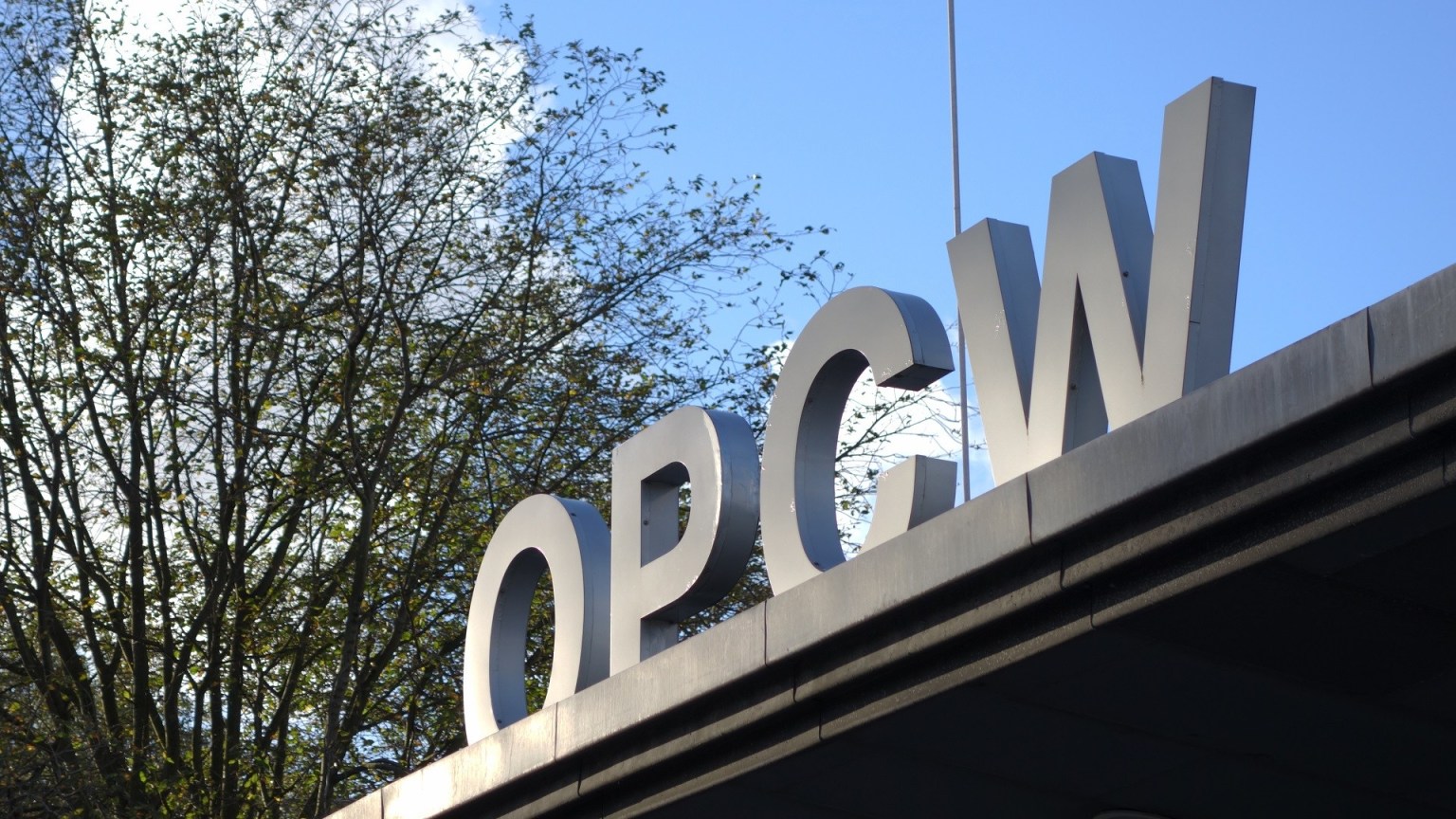 By
By 

what a massive amount of work went into this excellent coverage and thanks for it, but i, along with most other thinking folks never thought for a microsecond that assad ,relatively brilliant by comparison to the slack jawed baboons who believe this crap, would be so dumb that at a point when the national government- with the help of russia – had taken the upper hand in the bloody struggle initiated from outside, would stop and think: hey, now that we are winning, i have a great idea…let’s conduct a poison gas attack on little kids, and have a film crew on hand to spread the word about it!!!
they obviously think he is moronic enough to serve in our government…actually he can outspeak and outhink any in our brigade of buffooons, and do so in english,,,pssst: not his native language.
Has anyone ever done a tally of the victims of the gas attacks? In the first attack “rebels” were killed but, as Robert Parry pointed out, the rocket didn’t have the range to have come from a government position. At that time many groups were competing for American support so it would make sense to take out a rival (more sense than getting killed by engaging government troops).
After that first attack I don’t recall any rebels being killed. All the victims were women and children or families (were single men not considered worth sympathy or were they all “recruited” by the jihadis?).
Just saying.
Thanks to Aaron Mate for his dogged persuit of the facts when so many of the so called progressive journalists in the US has fallen into the group think of the humanitarian interventionists and “Russia gate.”